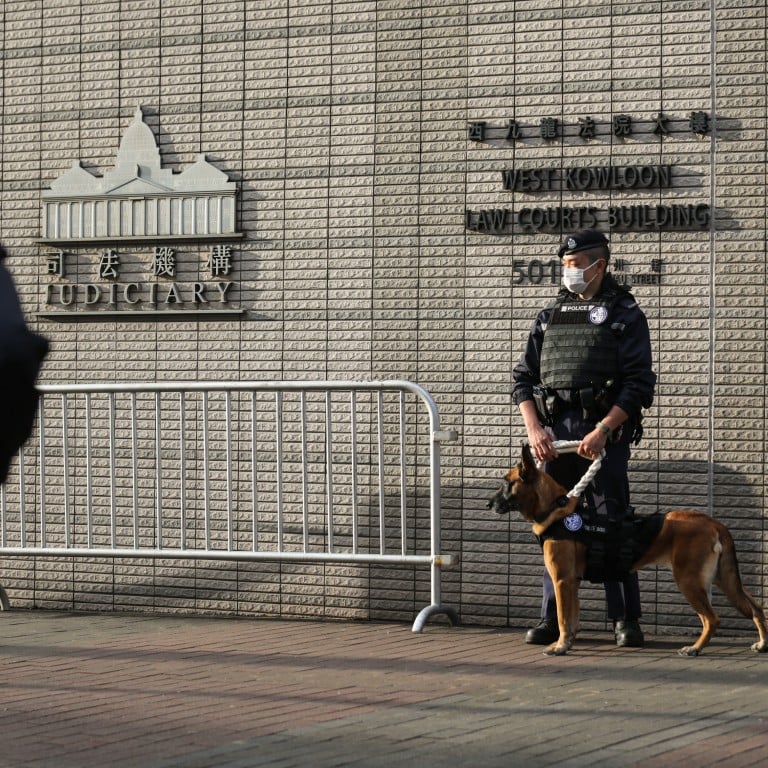
Jimmy Lai trial: key prosecution witness admits to lying to Hong Kong police 4 years ago after court grilling
- Jimmy Lai’s lawyers hone in on statement to police made by paralegal Wayland Chan, who is giving evidence as accomplice witness
- Chan admits he lied when he told police that Lai’s right-hand man instructed him to cease lobbying efforts after implementation of national security law
Chan in previous court sessions detailed his involvement in an alleged anti-China conspiracy, acting as a middleman linking Lai to the “Fight for Freedom, Stand with Hong Kong” (SWHK) advocacy group, which prosecutors said tried to bring about sanctions and a blockade to harm Hong Kong and Beijing.
Chan paused multiple times and appeared to provide conflicting answers when asked about the veracity of his earlier claims during his first police interview in October 2020.
West Kowloon Court heard Chan originally claimed in the interview that he was told by Lai’s right-hand man, Mark Simon, to cease lobbying for international sanctions after the Beijing-decreed law took effect in June that year.
The paralegal on Thursday testified those claims were false, but insisted they were not lies.
But he admitted he lied when he said Simon had instructed him to wrap up his activities in the aftermath of the security law’s implementation.
He said Simon had instead told him to continue his efforts to help trigger sanctions against Hong Kong and mainland China.
Hong Kong’s Jimmy Lai thought arrest would boost global attention, court hears
Chan added he had also falsely claimed in 2020 that he did not support “mutual destruction” and had “made fun of it”.
But the witness said he had nonetheless jeered at the doctrine at one point.
“I laughed, I did laugh. I poked fun at this concept of mutual destruction because I have mutually destroyed myself,” he told the court.
The paralegal was arrested a second time in February the following year under the security law.
The court heard Chan agreed to assist the prosecution in March 2021, 1½ months after his second arrest.
The witness on Thursday acknowledged that at no point in his 81 police interviews did he mention any conversation he had with Lai after the new law came into force.
But he said that did not mean he had decided to obey the law, saying the people around him were still pushing for international sanctions for what he saw as being for the city’s benefit.
‘Jimmy Lai opted to continue sanctions bid after Hong Kong security law took effect’
“The push for sanctions had to go on,” he said.
“At that time I felt that even heavyweights like Jimmy Lai remained fearless and set an example himself. I felt there were still things to be carried on, but to what extent was a question I was pondering.”
“After the [national security law], you did not agree with Mr Lai that you would carry out activities that were now unlawful under the [legislation] or to assist carrying out such activities. That never happened,” Corlett told the witness.
Prosecutor Anthony Chau Tin-hang rose in protest and said the witness could not provide a meaningful answer.
Mr Justice Alex Lee Wan-tang, one of three judges on the bench, said the question was “clear enough”, but his colleagues disagreed.
Madam justices Susana D’Almada Remedios and Esther Toh Lye-ping said the prosecution was relying on the conduct of different co-conspirators in contending an agreement was reached to further Lai’s conspiracy after it became illegal.
Remedios also pointed out Chan’s earlier evidence “implied some sort of understanding or agreement going on”.
Corlett reformulated his question and asked whether Chan had any verbal agreement with the mogul to break the new law after it took effect, which the witness denied.
The trial resumes on Friday.
